Hagen, Blitzstein, and Opera News: Book Review, Concert Review and Review of Review(s) by Leonard Lehrman
Comments Off on Hagen, Blitzstein, and Opera News: Book Review, Concert Review and Review of Review(s) by Leonard LehrmanDecember 4, 2019 by Admin

Hagen, Blitzstein, and Opera News:
Book Review, Concert Review and Review of Review(s)
by Leonard Lehrman © 2019
Nineteen years ago, Opera News published on its backpage a diatribe condemning the first production (Aug. 17-19, 2001, in concert, with piano) of Marc Blitzstein’s self-styled magnum opus, the 3-act opera Sacco and Vanzetti, completed by this writer over a period of 25 years. It had received positive reviews from all who had attended it (See http://ljlehrman.artists-in-residence.com/SaccoAndVanzetti.html) .
The ON critic, Joel Honig (October 13, 1936–September 25, 2003), had attended a symposium on the opera, but had not bothered to attend a performance. This prompted what ON itself called “A Storm of Protest”: 14 letters, of which the magazine printed five (including one from the Blitzstein Estate). The rest were posted by The New Music Connoisseur and are readable here: http://ljlehrman.artists-in-residence.com/NMCv10no1ltr.html (see particularly E. Randahl Hoey’s letter). Honig’s ON article, along with the published letters, is still available online, but only to subscribers.
An Uphill Battle
It has been an uphill battle since then, especially after Sept. 11, 2001, to bring a work to the stage again where anarchists are the heroes and law-enforcement the villains, though there have been numerous excerpt concerts, and a number of “near-misses”:
Carole Charnow, urged on by Howard Zinn, told me she wanted to produce the work with her Opera Boston, but lacked a mid-size theater: their small theater would have been too small, and they had trouble selling out their large space, even with The Crucible and The Consul, and in fact went bankrupt trying, shortly thereafter.
Conductor Kent Nagano proposed it to the Los Angeles Opera, but reported that “P.D. [Placido Domingo, then General Director there] shot it down.”
Philadelphia opera director Karen Saillant announced plans to do the work with her company in Italy in 2018, but then abandoned them, persuaded by her provincial Italian colleagues that it would be musically too sophisticated for their audiences.
Duet with the Past
 And then there’s Daron Hagen (b. Nov. 4, 1961), whose autobiography, Duet with the Past, has just been published by McFarland, and who has corresponded with me at length on the subject.
And then there’s Daron Hagen (b. Nov. 4, 1961), whose autobiography, Duet with the Past, has just been published by McFarland, and who has corresponded with me at length on the subject.
Good News
The good news, I’m happy to say, and for which I received a congratulatory note from Hagen, is that on November 14, 2019 the Huntington (NY) Arts Council announced its NYSCA Decentralization grants, including one for the New York premiere of the Blitzstein-Lehrman Sacco and Vanzetti at Hofstra as part of their annual Italian Festival, September 13, 2020. And Community Church of New York, which hosted my most recent operas, The Triangle Fire (see http://ljlehrman.homestead.com/TriangleFireFlyer.html ) and A Loveletter from Rosa Luxemburg (see https://www.youtube.com/ejtRe2zxcpo and http://www.soundwordsight.com/2019/02/works-of-social-consciousness-a-concert-review-by-mark-zuckerman/ ) in 2017 and 2019, respectively, will also host a Sacco and Vanzetti performance in 2020.
Takedown
Meanwhile, though, Opera News seems to have done a number on Hagen, similar to what they had done to me. On the backpage of the November 2019 issue, there’s a takedown review by Matthew Sigman of Duet with the Past which is almost in the same league as Honig’s screed. At least Sigman seems to have read the book, though not very carefully. An apology was apparently demanded, and given, grudgingly, in the December issue, for misreading a description of the death of Ned Rorem’s life partner James Holmes, in which Hagen played a passive role, not an active one, misattributed by the reviewer. But there’s more to apologize for than that. The last word of the review’s opening paragraph accuses the author of “matricide.” To be fair, matricide is a subject the composer dealt with head-on in an opera (Bandanna, p. 160) not long after the death of his mother. So it was on his mind. But the situation was in fact complex and arguably to Hagen’s credit: His mother had asked him to assist her suicide, and he did so. But that’s not “matricide,” except perhaps for a headline writer looking for a sensationalist “hook.” So what is Sigman’s, or rather Opera News‘ problem? The book is basically the story of a composer’s struggle to make a career, and a life, overcoming family alcoholism, in the very tough world of today’s classical (it used to be called “serious”) music.
Mentors
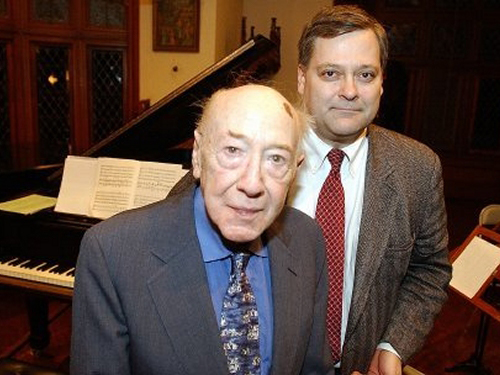
Daron Hagen with David Diamond
Many of Hagen’s mentors have been mine, including Rorem, Lukas Foss, David Diamond, Jack Beeson, Virgil Thomson, David Del Tredici, Leon Kirchner, Gian Carlo Menotti, Marc Blitzstein (posthumously) and of course Leonard Bernstein.
(The most notable name missing from this list is Nadia Boulanger (1887-1979), who mentored nearly all of them, but Hagen was born in November, 1961, just a bit too late to have had the benefit of studying with her – though he manages to mention her in his book several times anyway. In response to his self-indulgence and profligacy, I can imagine her saying to him what she once said to me, when I was burning the midnight oil, trying – successfully – to complete a year’s study of fugue in three months: “You can be ‘artiste.’ But you do not have to act ‘artiste’!”)
Except for Beeson and Kirchner, all of these men are/were gay/bisexual. So it was natural for George Perle’s wife Shirley to query Hagen (on p.95), when he came to copy some of her husband’s music: “I assume you’re gay,” and when told he was not: “But then why does Lenny like you?” Could it be that a non-gay denizen of the mostly gay world represented by Opera News is being given the resented outsider treatment here? (Reread E. Randahl Hoey’s 2001 letter to the magazine, and think about it.)
Rorem to Diamond
Hagen began studying with Rorem after Bernstein (on the strength of one score the young composer had sent him) recommended him to David Diamond (1915-2005) at Juilliard, which rejected him for lack of experience. After a few years at Curtis, writing 3 songs for each lesson – one on a poem of his own choosing, one Rorem chose, and one Rorem had already set (a wonderful method of pedagogy – I must try it with my students!) – Hagen was then accepted at Juilliard, and became quite close to Diamond, visiting him shortly before his death, and has had access to David’s unpublished, incomplete autobiography, which one hopes will someday see publication. Diamond told me and my wife Helene Williams that he considered his most important compositions to be his symphonies, his string quartets and his songs. We made the only CD devoted entirely to his songs, 25 of them, with his coaching and approval, received just a month before he died. (See http://www.musicweb-international.com/classrev/2006/Apr06/Diamond_troy817.htm).
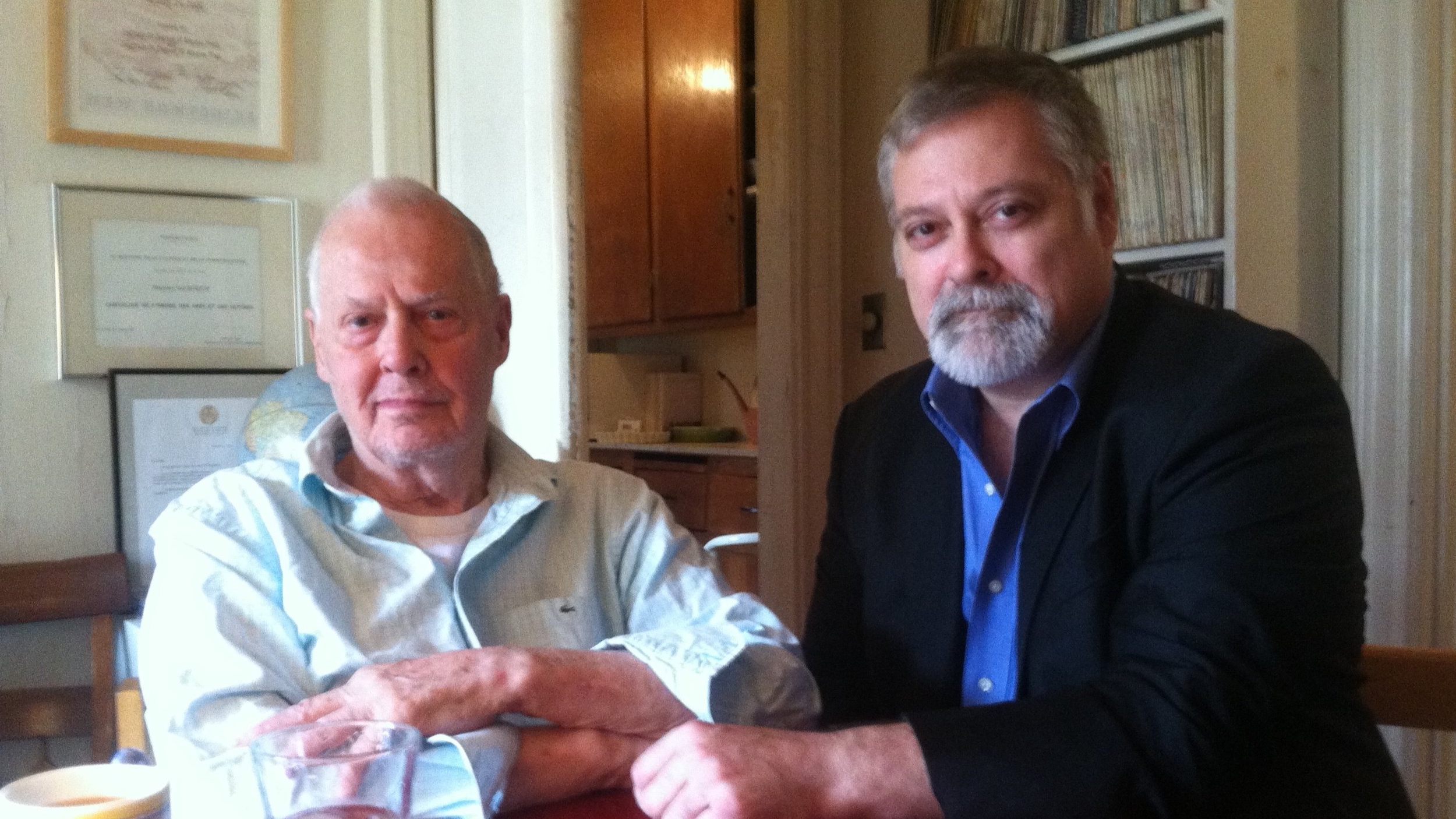
Ned Rorem and Daron Hagen
The most important advice Hagen seems to have received from anyone, though, was not from a teacher but a music critic, Daniel Webster, in Philadelphia, who told him (p. 67) to be “like Villa-Lobos… prolific” and to “write a lot. A lot.” Which he has done. In a diary note from 1981-82, he told himself: “Whatever I lack in talent, I’ll make up in hard work.” (p.60) He also got some very good, strong advice from Lukas Foss (p.114) on standing up for eclecticism, and himself.
Operas
Bernard Jacobson, in his Foreword to the book, credits Hagen with “around a dozen operas,” but I count only 8 in the works list that precedes the index. Perhaps that’s because some, like an early setting of Edward Albee’s The Sandbox, have been “withdrawn.” Sigman mentions Shining Brow for Madison Opera (in which Hagen claims to have deliberately imitated Blitzstein & Bernstein, though I didn’t hear that when I watched a video of it) and Amelia (as in Earhart) for Seattle Opera, with Bernstein collaborator Stephen Wadsworth as director, which has had largely favorable reviews, though Hagen’s arrogant remark that “I knew I could do at least as good a job… with my own material–better, in fact” (p.218) could hardly have endeared him to any director he’s worked with(!).
 Vera of Las Vegas, complete with “Strippers’ Chorus,” has also enjoyed some success in Ireland, in New York (with Center for Contemporary Opera), and in Las Vegas, with Hagen’s first wife, Donna (whose maiden name is never mentioned in the autobiography). And quite impressive is the number of his instrumental and vocal works, championed by among others JoAnn Falletta, Paul Sperry, William Smith, Lukas Foss, John DeMain, Marc Peloquin, David Alan Miller, Tom Piercy, Jaime Laredo, Sharon Robinson, and of course his present wife Gilda Lyons, with whom he’s blessed to have two sons. But Sigman is at least partly right that “despite a list of commissions of which most composers could only dream, despite grants and prizes and sojourns at Yaddo and MacDowell, Hagen carries a large chip on his shoulder.”
Vera of Las Vegas, complete with “Strippers’ Chorus,” has also enjoyed some success in Ireland, in New York (with Center for Contemporary Opera), and in Las Vegas, with Hagen’s first wife, Donna (whose maiden name is never mentioned in the autobiography). And quite impressive is the number of his instrumental and vocal works, championed by among others JoAnn Falletta, Paul Sperry, William Smith, Lukas Foss, John DeMain, Marc Peloquin, David Alan Miller, Tom Piercy, Jaime Laredo, Sharon Robinson, and of course his present wife Gilda Lyons, with whom he’s blessed to have two sons. But Sigman is at least partly right that “despite a list of commissions of which most composers could only dream, despite grants and prizes and sojourns at Yaddo and MacDowell, Hagen carries a large chip on his shoulder.”
Editing
Fault his editor for misnaming Hans Werner Henze “Heinz” and Karel Husa “Karl.” There’s a “c” in “Carl Fischer” (p.137). “My Lai,” not “Ma Lai” (p.160), was the site of the infamous massacre in Vietnam. Winterreise is feminine, not masculine (p.196). And there’s no umlaut in the word “Tonmeister” (p.162). But pick up the interesting loose ends of a projected opera on Arthur Miller’s All My Sons by James Legg (1962-2000) and an aborted Smithsonian Institution collaboration with Gore Vidal (1925-2012)….
Fondness for Blitzstein
Hagen’s fondness for the music of Blitzstein seems to have stemmed from his undergraduate days in Madison, Wisconsin, where the Blitzstein Archives are housed. I’ve visited them six times since 1970, making discoveries, correcting errors, and contributing materials, resulting in their starting a “Leonard Lehrman Archive” out there. Hagen studied many of the scores, and writes that he (p.88) “facilitated the first performances of the Blitzstein Piano Sonata since the 20s” – which is nonsense; I performed the work in Boston in the 1960s, in Berlin in the 1980s, and made the first recording in 2005 – released this past February on Toccata Classics: (see http://ljlehrman.artists-in-residence.com/ljlehrmanrecordings.html ).
Somehow Hagen never looked at, or at least never mentions looking at, Idiots First, which his teacher Ned Rorem called “Marc’s best work” (see http://ljlehrman.artists-in-residence.com/IdiotsFirst.html ), and which, in my completion, won a number of awards. But Hagen was interested in Sacco and Vanzetti, and writes that Leonard Bernstein asked him to consider completing it (p.87), even getting Jacob Druckman to offer him a commission for it, just a few months before I last saw Bernstein, in Berlin, in October 1984. “After spending a few days” with Blitzstein’s sketches, Hagen concluded “they were just too fragmentary, too raw. The finished score would require the creation of too much original material to flesh it out.” That was also Bernstein’s thinking, at the time. But neither of them had taken the trouble to study all of Marc’s pencilled notes to himself in the dozens of books he had collected on the subject. That’s where I found the structure he had been planning, and was then able to take material (with permission) from other Blitzstein works (as he himself had done and was doing), especially the unsuccessful urban folk opera, Reuben Reuben, which took place in NY’s Little Italy but closed in Boston in 1955, and develop it into the drama of two Italian immigrant anarchists.
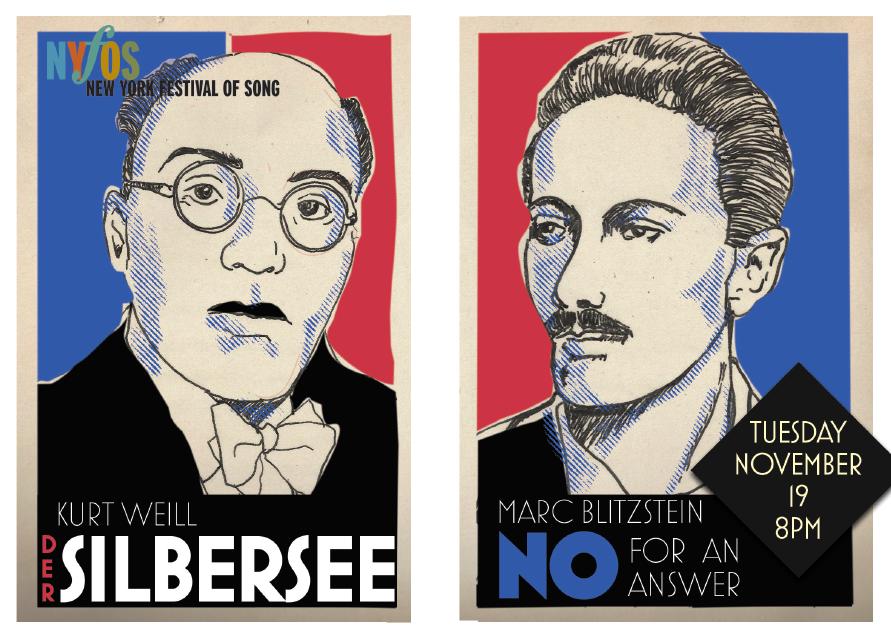
NYFOS
Meanwhile, another work of Marc Blitzstein’s, No For An Answer, had its first public performance in NY since 1960. Well, at least a partial performance. A brilliant quartet of young singers (Sari Gruber, Rebecca Jo Loeb, Alex Mansoori, and John Brancy), accompanied by Steven Blier and/or Michael Barrett at the piano(s), sang an hour’s worth of the score at Merkin Hall’s New York Festival of Song (NYFOS) concert, Nov. 19, 2019, coupled with a likewise abbreviated version of Kurt Weill’s Silbersee (Silverlake, in English). The latter was particularly noteworthy for the translation by Lys Symonette (1914-2005) of “Caesar’s Death.” Jonathan Eaton’s translations of the other numbers were less successful; one missed the brilliant hand of Blitzstein as translator, whose Threepenny Opera is a classic, Mother Courage is undeservedly little known, and Mahagonny is almost totally unknown – mostly because Lys Symonette deemed it unfinished and therefore unperformable, much as Daron Hagen had done with Sacco. They’re both wrong, and I hope to live long enough to prove them so.
No For An Answer
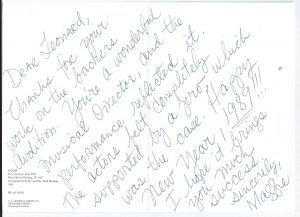 As for No For An Answer, Maggie da Silva (daughter of the great actor/director Howard da Silva) and I had been trying since 1988 to mount a NY production, for which we did several backers’ auditions. A complete performance did happen in San Francisco in 2001, including the number “Expatriate,” which had been only sketched and I completed (see https://youtu.be/pcObGlpfB9o ). (When I premiered that piece at Fontainebleau in 1996, David Diamond, who was in the audience, stood up and exclaimed: “This man writes Blitzstein!”) But the recording of that San Francisco production is viewable only onsite, so I have yet to see it. The NYFOS version included only 11 numbers, of which “Expatriate” was not one. Alex Mansoori stole the show with the first Bernie Sanders imitation I’ve ever seen in the middle of the classic “Penny Candy.” The generous program notes contained all the sung words, but left out most that were spoken – a mistake with Blitzstein, as his spoken words form an integral, musical part, of all his text settings. The final speech by the character of Clara, on the need for tolerant and humane behavior toward immigrants, was particularly moving. Her duet with her husband Paul, “Secret Singing,” is a highlight of the show. I’m surprised to see that there is no video of it on YouTube (only audio tracks). (Helene and I plan to correct that, with our Valentine’s Day concert in Florida next February!)
As for No For An Answer, Maggie da Silva (daughter of the great actor/director Howard da Silva) and I had been trying since 1988 to mount a NY production, for which we did several backers’ auditions. A complete performance did happen in San Francisco in 2001, including the number “Expatriate,” which had been only sketched and I completed (see https://youtu.be/pcObGlpfB9o ). (When I premiered that piece at Fontainebleau in 1996, David Diamond, who was in the audience, stood up and exclaimed: “This man writes Blitzstein!”) But the recording of that San Francisco production is viewable only onsite, so I have yet to see it. The NYFOS version included only 11 numbers, of which “Expatriate” was not one. Alex Mansoori stole the show with the first Bernie Sanders imitation I’ve ever seen in the middle of the classic “Penny Candy.” The generous program notes contained all the sung words, but left out most that were spoken – a mistake with Blitzstein, as his spoken words form an integral, musical part, of all his text settings. The final speech by the character of Clara, on the need for tolerant and humane behavior toward immigrants, was particularly moving. Her duet with her husband Paul, “Secret Singing,” is a highlight of the show. I’m surprised to see that there is no video of it on YouTube (only audio tracks). (Helene and I plan to correct that, with our Valentine’s Day concert in Florida next February!)
That performance did take place Feb. 14, 2020 and is now posted at https://youtu.be/SGjmBgVqQYA.
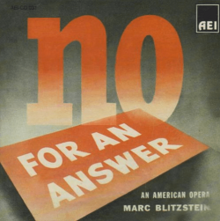 As I mentioned to Steven Blier afterwards, one of the songs in No For An Answer, a Lullaby, not included Nov. 19, had been a tremendous influence on Leonard Bernstein. Bernstein told Gottlieb this, according to Gottlieb’s University of Illinois doctoral thesis, though the story is not in any of his subsequent books about Bernstein. The melodic figure of a descending sixth followed by descending second, which concludes a phrase in said Lullaby, can be heard in many Bernstein works, most notably “Tonight” from West Side Story. (See my demonstration of that here: https://youtu.be/VYypxWCpMKQ .) But actually, Bernstein’s recall, though prodigious, was not perfect. His performance, from memory, of Blitzstein’s “Zipper Fly” differs greatly from the printed score. He mistakenly attributed the number “Musky and Whiskey” to Juno, when in fact it was part of Reuben Reuben. When I came to his studio to play him my completion of Idiots First Jan. 17, 1974, he remembered our Dec. 5, 1970 Harvard triple-bill which included his Trouble in Tahiti and Blitzstein’s Harpies, but also included Marc’s I’ve Got the Tune, which he (temporarily) misremembered as having been Marc’s first opera, Triple Sec. And I suspect Bernstein’s memory was faulty here too, for the Lullaby in question was never recorded and barely memorable, whereas that beautiful duet, “Secret Singing,” has that melodic figure in it, over and over; and that’s what I think he was remembering, even if he misremembered the title!
As I mentioned to Steven Blier afterwards, one of the songs in No For An Answer, a Lullaby, not included Nov. 19, had been a tremendous influence on Leonard Bernstein. Bernstein told Gottlieb this, according to Gottlieb’s University of Illinois doctoral thesis, though the story is not in any of his subsequent books about Bernstein. The melodic figure of a descending sixth followed by descending second, which concludes a phrase in said Lullaby, can be heard in many Bernstein works, most notably “Tonight” from West Side Story. (See my demonstration of that here: https://youtu.be/VYypxWCpMKQ .) But actually, Bernstein’s recall, though prodigious, was not perfect. His performance, from memory, of Blitzstein’s “Zipper Fly” differs greatly from the printed score. He mistakenly attributed the number “Musky and Whiskey” to Juno, when in fact it was part of Reuben Reuben. When I came to his studio to play him my completion of Idiots First Jan. 17, 1974, he remembered our Dec. 5, 1970 Harvard triple-bill which included his Trouble in Tahiti and Blitzstein’s Harpies, but also included Marc’s I’ve Got the Tune, which he (temporarily) misremembered as having been Marc’s first opera, Triple Sec. And I suspect Bernstein’s memory was faulty here too, for the Lullaby in question was never recorded and barely memorable, whereas that beautiful duet, “Secret Singing,” has that melodic figure in it, over and over; and that’s what I think he was remembering, even if he misremembered the title!
Looking forward to hearing Alex Mansoori in Alex Weiser’s new opera about Theodore Herzl, at Manhattan’s 14th St Y this coming Thursday, December 5…
Leonard Lehrman, composer of 244 works (including 12 operas and 7 musicals) and 70 translations, to date, adapted/completed 20 works begun by Marc Blitzstein, including the operas Idiots First and Sacco and Vanzetti, both published by Theodore Presser, authored the Blitzstein Bio-Bibliography for Greenwood Press, and edited the 3-volume Marc Blitzstein Songbook for Boosey & Hawkes. His 70th birthday was commemorated by concerts, on Aug. 18 [see https://www.youtube.com/playlist?list=PLmhHI8m9j-XuiRpZqpQvdgieWQZz60mJv ] at Roslyn, NY’s Trinity Church (where he was Artist-in-Residence this past year) and Aug. 20 [see https://www.youtube.com/playlist?list=PLmhHI8m9j-XtNhYNV_FtfpaOOh2xhsgWq ] at Oyster Bay-East Norwich Public Library, where he has served as Reference Librarian since 1995. On Nov. 14 he spoke on a panel on “The Arts & Propaganda” at Huntington Arts Council, posted here: https://youtu.be/INgB-r335fQ. His newest song cycle, on poems by Mihai Eminescu (1850-89) and Zygmund Tauberg (1927- ) will be premiered next year in Bucharest and Florida, in Romanian and in English. This is his 23rd article for SoundWordSight.com.
Category Sight, Sound, Word | Tags:
Comments Off on Hagen, Blitzstein, and Opera News: Book Review, Concert Review and Review of Review(s) by Leonard Lehrman
Sorry, comments are closed.

